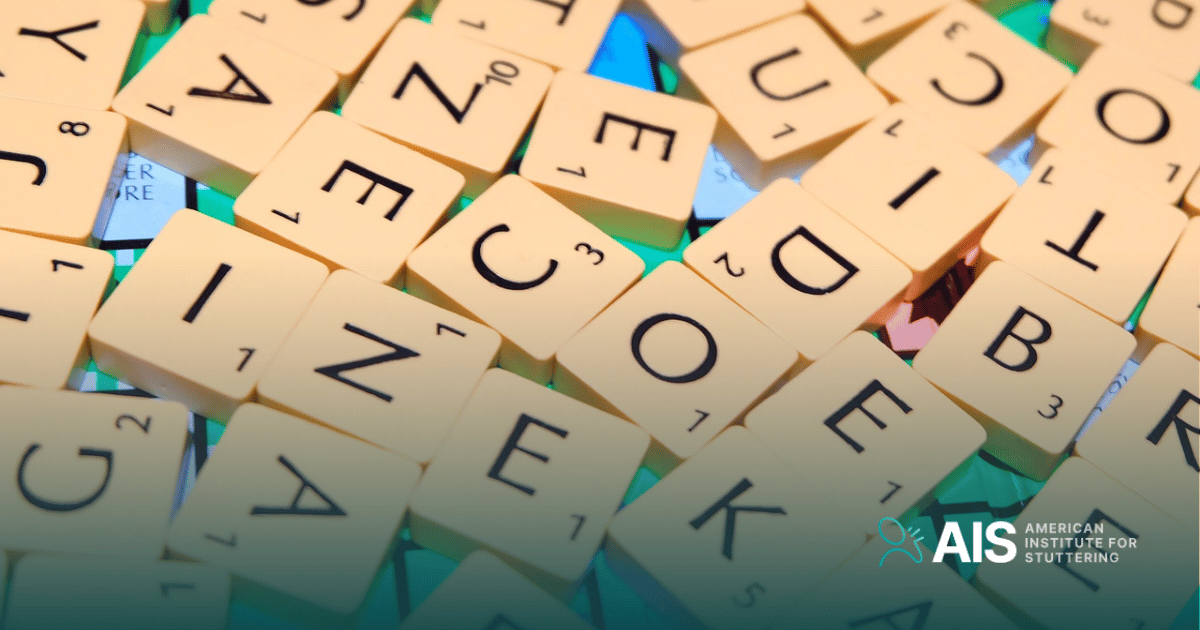What Are "Stuttering Words"? Understanding the Language of Stuttering



You see someone you don't know walk up to you, making eye contact and nodding in greeting, and you know that they're going to ask for your name.
You start to think of all the words you might stutter on, the ones you've had trouble with in the past, and the ones that just feel like they'll be hard.
Your heart starts beating fast, you tense up, and you try to think of any way you could avoid the introduction.
As they say hi, you wonder how you can get through the next few seconds without getting stuck, knowing that you'll stutter on your own name.
Moments like this illustrate a common experience for people who stutter: certain words can feel “heavier” or more difficult to say, shaping how they feel in everyday situations.
Are there certain words that a person who stutters is more likely to stutter on? Are there factors that influence which words a person might stutter on?
This blog post will look into the answers to these questions, as well as others.
But first, let’s identify what people often mean when they talk about “stuttering words,” and why the concept isn’t as straightforward as it might seem.
To start, we'll outline the different types of stuttering that may interrupt the smooth flow of speech. There are three main types of stutters:
These forms are considered stuttering-like disfluencies (SLDs), which are different from typical disfluencies such as whole word repetitions (you-you-you), phrase repetitions (I want-I want), revisions (I had…I ate a sandwich), and interjections (um, you know, like).
While both forms affect speech fluency, SLDs are the ones associated with Childhood-Onset Fluency Disorder, also know as developmental stuttering, as described in the Diagnostic and Statistical Manual of Mental Disorders (DSM-5-TR).
For this post, we’ll be focusing on stuttering within this context—the experience of people who stutter, rather than typical speech disfluencies that occur in everyone’s speech from time to time.
Understanding these distinctions can help make sense of why certain words or sounds might feel more challenging than others for people who stutter.
Learn how AIS defines and treats fluency disorders and developmental stuttering through speech and language treatment: https://www.stutteringtreatment.org/speech-therapy/stuttering-therapy
When people talk about "stuttering words," or words they commonly stutter on, they are usually describing the certain syllables, sounds, or words they feel are harder to say, that affect their speech production. However, there's more to it than just the words themselves.
Below are some factors that may affect which words feel more challenging.
Certain sounds in the English language, such as "k," "t," and "b" involve a build up of air pressure, followed by a release in order to make the sound.
This natural level of pressure may coincide with moments of tension for people who stutter, possibly making these sounds more difficult.
Many people who stutter find that they tend to stutter more on content words (words that carry meaning; e.g., nouns, verbs, adjectives) as opposed to function words (connecting words; e.g., of, is, and).
This may be because content words hold more communicative weight, or because they may be more difficult to avoid.
Certain words are not easily swapped out (e.g., names, places, technical terms, when reading aloud), which can make some people feel out of control because there's no "backup" word available. This can create extra pressure or self-monitoring due to feeling out of control.
This highlights one way in which avoidances (such as word substituting) can actually backfire at times, and may result in more difficulty.
If a person stuttered on a particular word in the past, the brain remembers previous "hard" moments on certain words, which can make those words more likely to trigger anticipation or tension during speech.
This shows how stuttering is often shaped by thoughts and emotions, not just motor mechanics.
When children first start to stutter, usually somewhere around an average age range of 2-5 years, there isn't any avoidance. They are talking with peers, saying what they want to say, moving through stutters, and most children are confidently communicating!
For these children, stuttering is not affecting them negatively. Speaking is still a natural and fluid process, even when they repeat or stretch a sound, or get stuck.
Avoidance, tension, and self-monitoring typically develop in later ages with childhood stuttering, often in response to repeated experiences of difficulty and negative reactions from others. This transition from natural speech to disfluent speech often involves growing speech anxiety and increased avoidance behaviors, which can negatively impact long-term fluency development.
This helps explain why early stuttering looks different from stuttering in older children and adults - the child's disfluencies are mostly free of struggle, and words don't carry the same weight that they might acquire later.
Understanding this early stage is important, because it highlights that the extra stress and the negative emotions that often accompany stuttering are not inherent to the disorder itself.
With supportive therapy and treatment, people who stutter can and are able to speak more openly and confidently, including on those words that previously were seen as particularly hard.
See what AIS treatment for children looks like here: https://www.stutteringtreatment.org/who-we-help/stuttering-therapy-for-preschoolers
When these patterns set in and certain words feel especially difficult, it's common for people who stutter to try to avoid them at all costs.
This might mean changing words, limiting what they say, avoiding specific social interactions, or even avoiding speaking entirely.
These behaviors (as well as other behaviors, such as eye blinking or head nodding), often referred to as secondary behaviors, can mask the core symptoms but tend to increase speech tension and reduce overall fluency.
While they can bring short-term relief (because it feels good to not be uncomfortable!), they actually reinforce the struggle that is making those words so challenging in the first place.
The anticipation leading up to saying the words backfires and increases the likelihood of getting stuck on the word itself. The cognitive energy spent monitoring speech and rehearsing sentences takes a physical and mental toll, taking a person out of the present moment.
Over time, avoidance can result in reduced self-esteem, increased stress, and unhealthy negative feelings.
In this way, it doesn't just affect the words a person says, but it shapes their relationship with talking itself, resulting in communication that feels more effortful, less comfortable, and less authentic.
The good news is that avoidance doesn't have to define the speaking experience!
Recognizing these patterns is the first step to making change, and addressing them in therapy can help to reduce the struggle that is so closely connected to those difficult words for stuttering. Learning to move through stutters in an easy, forward-moving way allows communication to feel more free, less burdened, and more authentic.
Check out examples of what some clients have shared about how speech therapy has shaped their relationship with stuttering here: https://www.stutteringtreatment.org/client-testimonials
If certain words feel harder to say, you don't have to face that challenge alone. Speech therapy for stuttering can make a meaningful difference in how you navigate the times where difficult stuttering occurs.
The speech therapists at AIS are professionals who are highly trained specialists in stuttering treatment and are dedicated to helping individuals speak confidently, comfortably, and authentically.
With experienced clinicians, research-backed treatment approaches, and a strong community, we are committed to empowering people who stutter.

Here are some aspects that stuttering treatment may focus on:
For more information, or to receive an expert opinion on if therapy is a good fit for you, see how AIS approaches speech-language therapy for adults who stutter: https://www.stutteringtreatment.org/who-we-help/speech-therapy-for-adults
A: There isn’t one universal list of words that people struggle the most with because the experience is different for everyone. That said, some people find that certain sounds that involve a release of air pressure (like “k,” “t,” or “b”), content words (nouns, verbs, adjectives), or words they cannot easily swap out (such as names or technical terms) can feel harder to say.
A: No. The words that people stutter on can vary widely depending on the individual. A word that feels difficult for one person may feel easy for another. Personal history, past experiences, and the emotions tied to specific words can all play a role in how “heavy” they feel.
A: Names often feel like some of the hardest words to say for people who stutter because they cannot be substituted. When you’re asked your name, there is no alternative answer, which can create extra pressure and anticipation that build up each time you say your name. This often makes names a common example of stuttering words.
A: Yes. Speech therapy for stuttering, led by a speech-language pathologist, can help people of all ages reduce the struggle around stuttering words. Therapy focuses on building confidence, reducing tension, and learning strategies to move through moments of stuttering with greater ease, reducing the pressure, anxiety, and anticipation that make some words feel extra hard. Current data suggests that a holistic approach to therapy is the key to achieving meaningful, lasting progress.
--
The American Institute for Stuttering is a leading non-profit organization whose primary mission is to provide universally affordable, state-of-the-art speech therapy to people of all ages who stutter, guidance to their families, and much-needed clinical training to speech professionals wishing to gain expertise in stuttering.
Offices are located in New York, NY, Atlanta, GA, and online. Our mission extends to advancing public and scholarly understanding of this often misunderstood disorder.
Call us today at 212-633-6400 or contact us online to learn how we can help you speak freely, and live fearlessly.
Worried about the cost of therapy? Our Freeing Voices, Changing Lives Scholarship Fund offers need-based financial assistance, thanks to generous donors.


